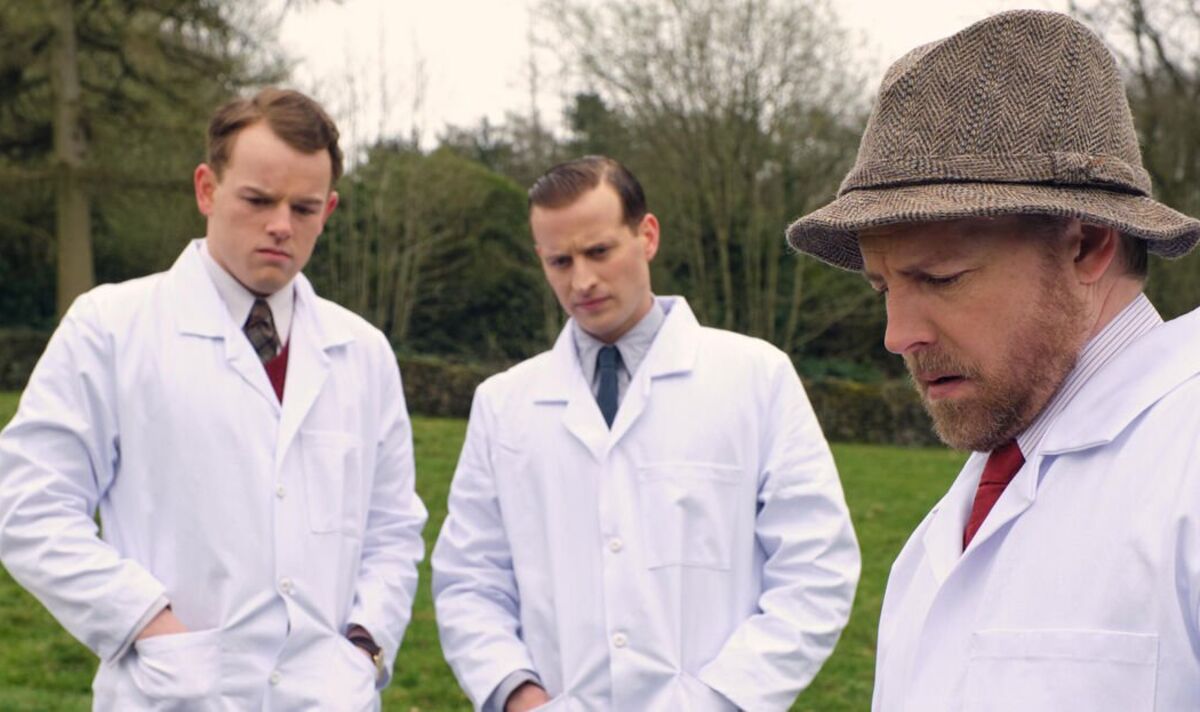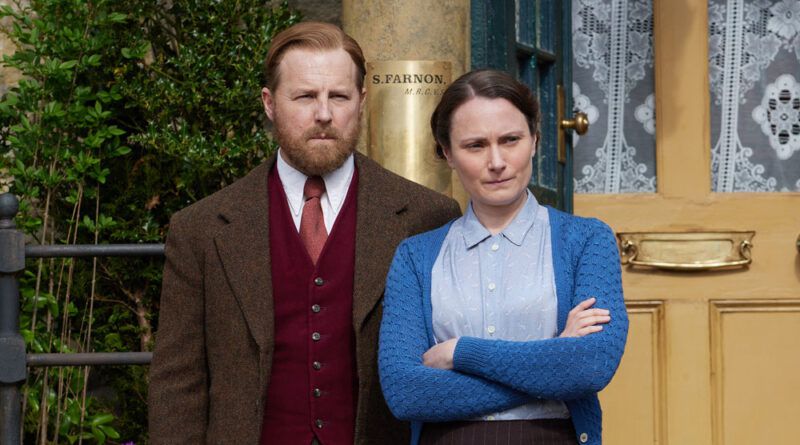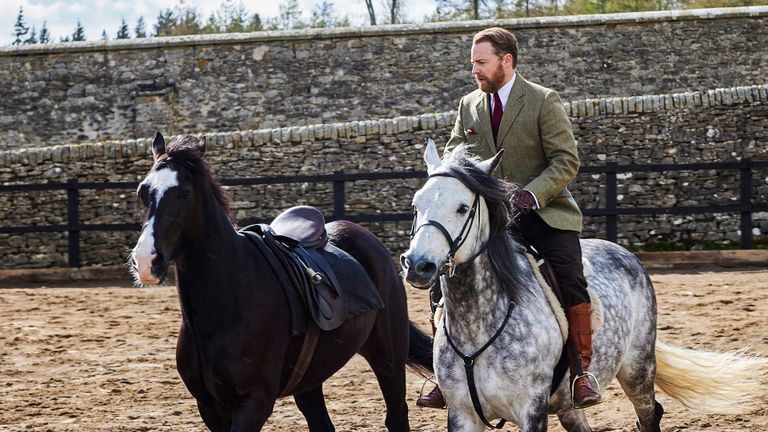This week’s episode of All Creatures Great and Small — the third episode of the third season, entitled “Surviving Siegfried” — offered something rare for this series: flashbacks.
The show, adapted from the internationally bestselling series of memoirs by veterinary surgeon Alf Wight, who wrote under the pen name James Herriot, has thus far been situated squarely within the late 1930s in the sleepy English farming community of Darrowby, a fictionalized corner of the Yorkshire Dales where 21st-century viewers might burrow away for an hour a week and let their troubles be replaced by gentle tales of rural animal care. The series centers on veterinary surgeon James (Nicholas Ralph), who toils under the watchful eye of the persnickety Siegfried Farnon (Samuel West), whom he struggles to please — though not as much as Siegfried’s layabout brother, Tristan (Callum Woodhouse), does.
All of these figures are familiar to readers of Herriot’s books. But they first became staples of the TV landscape in 1978, when the BBC premiered the first serialized adaptation of All Creatures Great and Small. To call the new series a remake of the prior one would be inapt, as both take their own liberties in adapting Herriot’s books. But in Siegfried’s awareness of the traumas of war, the two series do feature remarkable echoes. Two iterations of the same man are both beset by the same righteous world-weariness, one that would have resonated just as clearly four decades ago as it does today.
“Surviving Siegfried” transports the viewer to Belgium in 1918, a schism in the series’ typical operations that underscores just how present the First World War remains in the consciousness of characters now facing down the Second. There, a younger version of the typically jovially eccentric Siegfried — played in these segments by Andy Sellers, and now seen as a solemn captain in the Royal Armed Forces around the time of Armistice Day — is tasked with caring for his major’s wounded horse.
“Physically speaking, he’ll make a full recovery,” this younger version of Siegfried remarks of the animal. But there’s another, perhaps even greater wound: “the damage we can’t see.”

In the show’s present, another war looms, casting a shadow over a series that has previously struck a comforting note of escapism. Jeeps pass the car as Siegfried shuttles between Darrowby and the outlying farms; the previous season closed with his housekeeper, Mrs. Hall (Anna Madeley) watching a spitfire strafe the sky. Now, Siegfried has been called upon to care for another traumatized horse — River, who will not be ridden — and though the oncoming brutality has not yet touched these particular creatures, its specter dominates the season.
“Are you all right?” Tristan asks the obstinate vet while driving him back to see River. Siegfried himself has been thrown from the horse so many times he can barely walk, let alone operate a vehicle.
“That’s a stupid bloody question!” Siegfried snaps. “Of course I’m not! None of us is! Nor should we be! State of the damn world — there’d be something wrong with us if we were!” The line fits the character and story, but it might well strike a chord for present-day viewers as well. How many of us can truly feel all right given the state of our own damn world? Thus, the gently antic All Creatures Great and Small must balance its status as a comforting tonic to a messy and painful 21st century and its awareness of the fact that the world has always been more complex than any of us would prefer.
The world was no less complex and painful 43 years ago this month, when the BBC premiered the third season of the original televised All Creatures Great and Small. The season aired less than a year into Margaret Thatcher’s term as Prime Minister (the run of the original series would match up with her 11 years in office to within a year), amid a time of tremendous unrest in the United Kingdom, a nation still reeling from a year of unprecedented strikes, the peak of which would be retrospectively termed the Winter of Discontent.

That season’s fifth episode, titled “If Wishes Were Horses,” serves as a parallel to, if not the basis for, “Surviving Siegfried.” Again, we see Siegfried (here played by Robert Hardy) caring for a horse, though this time the infection is of the hoof as opposed to River’s spiritual malady. Siegfried is in his element dealing with the creature, and even leaves the operation feeling giddy. “Summer’s morning in an English village,” he beams. “Nothing like it.”
“Not if you’ve got time to appreciate it,” James (Christopher Timothy) agrees.
But the bliss is swiftly shattered by the news that two local boys are off to join up with the RAF themselves. “I reckon it’s their duty,” the boys’ father remarks, but Siegfried is visibly shaken. “The politicians have failed,” he mutters as the boys head off to enlist. “Now it’s up to people like them… to pick up the pieces.”
“If Wishes Were Horses” aired in January 1980, just a few weeks after Britain’s steel workers walked off the job for the first time in more than half a century. That strike would last 13 weeks, ending just a few days before the third season of All Creatures Great and Small did, the world’s wintertime discontent once more forming a bracing contrast with a gentle series. The finale, which bid these characters adieu for the eight years that elapsed before the fourth season, ends on the image of Siegfried and James off to enlist as well. “Nothing’s certain anymore,” Siegfried murmurs toward the end of the episode.
The same could be said of the world into which the third season of All Creatures Great and Small has premiered, as we enter the fourth year of the COVID-19 pandemic, and amid a rising tide of global fascism that’s becoming normalized with shocking swiftness. The series premiered in September 2020, less than a year into the pandemic, and while it might be a bit convenient to suggest James Herriot and his comic entourage emerge during these moments of widespread despair to guide us toward something like hope… Well, if the horseshoe fits.

In Belgium, we learn, Siegfried was forced to oversee the mass slaughter of horses deemed essentially worthless once they were finished carrying soldiers into battle. Now called upon by his onetime commanding officer to do the same to River, a racehorse that won’t race (“Good for nought but dog food,” an onlooker grumbles as Siegfried tries to tame the wild thing), Siegfried puts his foot down.
“Surely we don’t need to repeat the mistakes and cruelties of the past!” he begs this man he still calls Major. When the older man gruffly asks how many times he’s willing to be thrown off, Siegfried responds with certainty: “As many as it takes.”
Siegfried refers to his determination to help River, but his resolve is more generalized. When asked to break the horse, he informs the major that his job is, in fact, to put the animal back together again. It’s the same task we all wake up to every day: the need to play what little role we can in reassembling a world that feels like it’s breaking so quickly the pieces might crumble in your hands.
“We’ll have to come to terms with it, Siegfried,” James tells his partner in the original series. “There really is no other way.”
“You’re right, of course,” Siegfried agrees. “The human animal is the most wonderfully adaptable of all.” It’s unclear whether Siegfried believes his own words. He seems quite close to tears when he says it. But “Surviving Siegfried” ends on something closer to catharsis: River allows himself to be ridden. The major’s horse is saved.
In one flashback segment found toward the middle of “Surviving Siegfried,” we learn that only one horse returned from Belgium: the major’s personal steed. The writers chose to name the horse Orpheus, and their reasoning would seem clear. Like Siegfried himself, this creature — so great and yet so small — has walked into hell. Now, his task is to reemerge without looking back.
All Creatures Great and Small is available to watch on PBS Masterpiece.
- SEO Powered Content & PR Distribution. Get Amplified Today.
- Platoblockchain. Web3 Metaverse Intelligence. Knowledge Amplified. Access Here.
- Source: https://www.polygon.com/entertainment/23563024/all-creatures-great-and-small-season-3-analysis



